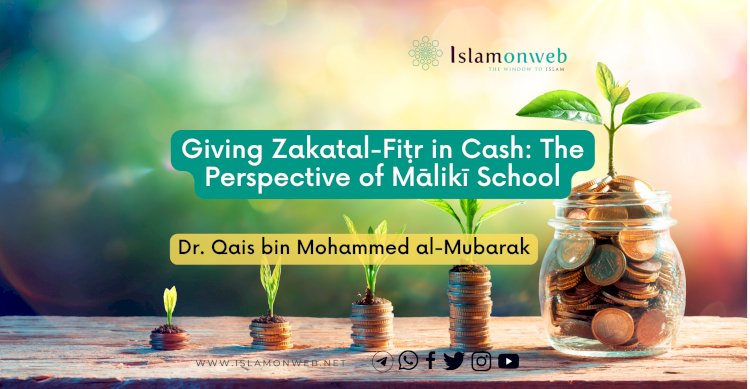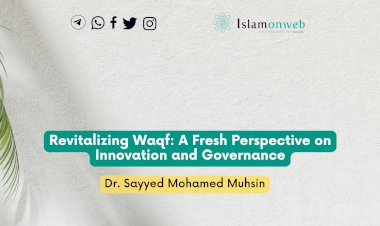Giving Zakatal-Fiṭr in Cash: The Perspective of Mālikī School
Maliki school holds two opinions regarding the paying Zakatal-Fiṭr in cash. Pointing out the disagreements over giving in cash, Abū ‘abdillāh al-Qurṭubi (d. 671 H) states: The reports from Mālik varies about giving zakat in price values as he had approved it once and forbade sometime else.[i]
First opinion: The well-known opinion (Mashhūr) of Maliki school is that Zakatal-Fiṭr must be taken out from the staple food of the region, and it would not be given from non-staple food. Sheikh Aḥmad al-Dardīr says: It (Zakāt) must be paid from the most eaten staple foods of these nine food items[ii] and to give from other items is not enough.[iii] However, in the case where the staple food of the region is other than these items such as meat, broad bean (fūl), lentil, then Zakat mustt be paid from that food. Ibn ‘abd al-Barr (d. 463 H) says: That is the correct opinion from Mālik and most of his disciples.[iv] In al-Mudawwanah, Mālik is seen saying that to give goods (‘arḍ) as Zakat al-fiṭr is not enough.[v] ‘Arḍ refers to things other than Dirham and Dinar.

Second opinion: To give Zakat al-fiṭr in cash is sufficient.
This opinion is based on the prophetic hadith commanding to make them (the needy and poor) self-sufficient (the needy and poor) from begging (in the markets and streets asking for food) on that (Eid) day.[vi] To al-Qāḍi ‘abd al-Wahhāb al-Baghdādi, (d. 422 H) this hadith signifies that the implementation of this hadith is materialized by offering the staple food familiar to them.[vii] Likewise, Abū ‘abdillāh al-Qurṭubi also views that the Prophet (ﷺ) intended anything to fulfil their needs and thus whatever thing satisfying their wants is permissible.[viii]
Al-Bukhāri narrates: Whoever had to pay one Bint al-makhāḍ (one-year-old she-camel) as Zakat and he did not have it, but had got one Bint labūn (two-year old she-camel), it could be accepted from him as Zakat and collector of Zakat would return him 20 Dirhams or two sheep. The scholars (in favour of the second opinion) said that: This hadith implies fixing price values in Zakat. Similarly, bringing Imam Muslim’s narration on the authority of Mu‘āwiya Ibn Abī Sufyān that he delivered on pulpit (minbar): I think two mudds of wheat from Sham are equivalent to a Ṣā‘ of the dates, they argue that there is not any naṣṣ which forbids giving zakat in price values.
This is the very view of the Hanafi school as well as ‘Umar Ibn ‘abd al-‘Azīz. In Abu ‘abdillāh Ibn Rushayd al-Fihri al-Sibti’s (d. 721 H) comments on the chapters of al-Bukhari, he mentions al-Bukhāri also holds the same opinion. He further says: In this regard, al-Bukhāri agrees with the Hanafi school despite of his many disagreements with them as evidence had led him to this conclusion.[ix]
Here, I think it is better to elaborate on this view of Maliki school’s a little bit more:
‘īsa Ibn Dīnār (d. 212 H) had reported this opinion from his Sheikh Ibn al-Qāsim.
Ibn Abī Zayd al-Qayruwāni (d. 386 H) notes ‘īsa quoting from him (Ibn al-Qāsim) that he does not see any issue in acting so (paying Zakat in price value).[x]
Abu bakr Ibn Yūnus al-Ṣiqilli (d. 451 H) said: ‘īsa reported from Ibn al- al-Qāsim, if one acts so, it is enough for him.[xi]
After stating the permissibility of whether if Zakat collector takes an animal of different age or replace it with gold or silver, it is enough and he stands on behalf of Mujtahid judge who is free to enforce his decision,[xii] Ibn ‘Abd al-Barr come to say that it is reported from Mālik and a group of his disciples that whoever gives price in Zakat al-fiṭr, it would suffice from his part, drawing analogy on the permissibility of the Zakat collector taking an animal of different age or replacing the exact animals from the collection.[xiii]
Thus, the dominant opinion (Ẓāhir) of Maliki school regarding the payment of price value in Zakat is detestable (Makrūh). Touching this point, Khatimat al-Muḥaqqiqīn al-Sheikh Aḥmad al-Dardīr says that this opinion (of Karāhat) includes Zakat al-fiṭr also.[xiv] Nevertheless, al-Sheikh ‘ilīsh objects to this inclusion, stating: This inclusion is not acceptable as I could not see anyone adhering to this view after referring to the commentators of (Khalīl Ibn Ishāq’s) Mukhtaṣar several times.[xv] However, Ibn ‘abd al-Barr’s remarks suggest that this case is analogised with Zakat. Tāj al-Ḍīn Bahrām al-Dumayri (d. 805 H) also mentions Ibn al-Qāsim saying that whenever the payment of price value happens in Zakat al-fiṭr, then it is enough for him.[xvi]
Abul ‘Abbās al-Wānsharīsi (d. 914 H) says: It is said that Sheikh Ibn ‘Arafa had permitted paying zakat al-fiṭr on the first of Ramadan and he used to issue fatwas that whether the zakat collectors had taken it as price value at the first of the month, it would be regarded as sufficient. Thus, he had opposed others in both terms (giving in cash early in the first of Ramadan) as the necessity demands it.[xvii]
Abu Sa‘īd al-Barādhighi (d. 372 H) mentions: to pay zakat in price value equals a man buying his own ṣadaqah. He says: A man owed Zakat on a property (al-‘ayn), would not pay zakat in goods or foods, and it is detestable for one to buy his own ṣadaqah.[xviii] Thus, buying one’s own ṣadaqah is supposed to be detestable. Khalīl said that the well-known opinion (Mashhūr) in this case is that it is detestable and not forbidden (Ḥarām).[xix]
Ibn Yūnus reports Mālik saying that it is not sufficient to give Zakat in the form of goods and foods for one owed of Zakat in al-‘ayn, and others including ‘Umar Ibn al-Khaṭṭāb, Ibn ‘Umar and Jābir Ibn ‘Abdillāh view buying one’s own ṣadaqah as detestable.[xx]
Describing about giving zakat in price value, Abul Ḥasan al-Lakhmi (d. 478 H) quotes Ibn al-Qāsim and Ashhab in al-Majmū‘a that it is makrūh and whoever does so, it is sufficient for him.[xxi]
Shihāb al-Din al-Qarāfi (d. 684 H) says: if it (giving Zakat in price value) happens, it is valid and this opinion is said by Ibn al-Qāsim and Ashhab in al-Majmū‘.[xxii]
Thus, the well-known (Mashhūr) opinion of the school states that it is makrūh. Khalīl Ibn Isḥāq al-Jundi (d. 767 H) says about Zakat collector taking zakat in price value: Most (jurists) holds that the well-known (Mashhūr) opinion is to give in price value is makrūh. Then he mentions Ibn Yūnus explicitly saying that the right opinion is its sufficiency. He said: it is the perspective of detestability of one buying his own ṣadaqah. Likewise, Sanad also holds the same opinion. Upon this, it is also possible to conceive (Mālik’s) comments on al-Mudawwanah in terms of detestability.[xxiii]
To Ibn Rushd, (d. 595 H) the sound opinion is that it is makrūh. In addition, he explained the detestability that even though he had given of what he owed, he paid something other than what he was owed and thus to give zakat in cash means returning one’s ṣadaqah back to himself as if he had bought ṣadaqah owed upon him by the value price he had given. Then, Ibn Rushd comes to refute this analogy saying: however, this does not construe the real taking back as he did not return what he had given in fact.[xxiv]
Stating that Mālik said it is not enough to give price value in Zakat, Abu ‘abdullāh al-Mawwāq (d. 897 H) directs towards ‘īsa Ibn Dīnār’s report from Ibn al- al-Qāsim that whoever acts so, it would suffice him.[xxv]
Ibn ‘Arafa al-Dasūqi (d. 1230 H) quotes Abu ‘Ali al-Misnāwi saying that their (jurists’) dominant (Ẓāhir) opinion is that of al-Tawḍīḥ and Ibn ‘abd al-Salam’s view which is further substantiated by Ibn Rushd’s selection as he said the sufficiency is the most dominant opinion (aẓhar) and Ibn Yūnus appreciation of it.[xxvi]
Sheikh Aḥmad al-Ṣawi (d. 1175 H) also adheres to the view that is giving zakat in cash as sufficient whereas he says: the most dominant opinion (aẓhar) it is enough as the receiver of zakat could fulfil his needs of that day by cash.[xxvii]
Hence, it is obtained that giving zakat in cash goes against the well-known opinion (Mashhūr) of the Maliki school.
It must be noted that giving zakat as food often leads to circulation of these very foods among Zakat donors, the poor and the merchant as the donor buys the food of fiṭr for twenty riyals then gives fiṭr to the poor and the poor sells it to the merchant for ten riyals and the merchant goes on selling it to another customer for twenty riyals. Thus, the fiṭrah revolves between these parties, whereas the merchant gains profit and the faqeer loses. As this instance is clearly annulling the expected objectives of Zakat fiṭr and violating the wisdom behind its legislation, it is better to act upon the less-known opinion by giving zakat in cash in order to ward off these said problems. That is why Ibn Rushd is saying: ‘ain (Cash) is more beneficial as he could purchase by it whatever things he wants and by cereals he could not purchase something else.[xxviii]
Endnotes:
[i] al-Jāmi‘ li Aḥkām al-Qur’ān: 8:175
[ii] These nine food items are: Wheat(qamḥ), Barley (Sha‘īr), Rye(Sult), Maize(Dhurrat), Millet (Dukhn), Rice (Aruz), Dates (Tamr), Raisin (Zabīb), Jameed (aqiṭ)
[iii] Aqrab al-Masālik, With al-Ṣāwi’s Ḥāshiya: 1: 676
[iv] al-Kāfi: 1: 323
[v] al-Mudawwanah: 2: 358
[vi] al-Sunan al-Kubra: 4:175
[vii] al-Ma‘ūna: 1: 439
[viii] al-Jāmi‘ li Aḥkām al-Qur’ān: 8:175
[ix] See. Ibn Ḥajar, Fatḥ al-Bāri, 3: 312
[x] al-Nawādir wa al-Ziyādāt: 2: 303
[xi] al-Jāmi‘ li Masā’il al-Mudawwanah: 4:366
[xii] al-Kāfi: 1: 320
[xiii] al-Kāfi: 1: 323
[xiv] al-Sharḥ al-Ṣaghīr: 1:669
[xv] Fatḥ al-‘aliyy al-Mālik: 1: 406
[xvi] al-Shāmil: 1:193
[xvii] al-Mi‘yār al-Mu‘rib: 1:447
[xviii] Tahdhīb al-Mudawwanah: 1:446
[xix] al-Tawḍīḥ: 2:357
[xx] al-Jāmi‘: 4:181
[xxi] al-Tabṣirah: 3:1005
[xxii] al-Dhakhīra: 3:121
[xxiii] al-Tawḍīḥ: 2:277
[xxiv] al-Bayān wa al-Taḥṣīl: 2: 512
[xxv] al-Tāj wa al-Iklīl: 3:258
[xxvi] al-Sharḥ al-Kabīr: 1:502
[xxvii][xxvii] Ṣawi’s commentary on al-Sharḥ al-Ṣaghīr: 1:676
[xxviii] al-Bayān: 2:486
About the author: Dr. Qais bin Mohammed al-Mubarak is a Professor of Islamic Jurisprudence, at King Faisal University, Al-Ahsa.
Trasnlated by: Habeeb Rahman Kodakkad is a post graduate reserach scholar at Department of Civilizational Studies, Darul Huda Islamic University.
hrnkkd@gmail.com
Disclaimer
The views expressed in this article are the author’s own and do not necessarily mirror Islamonweb’s editorial stance.
























Leave A Comment